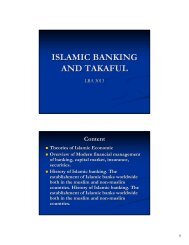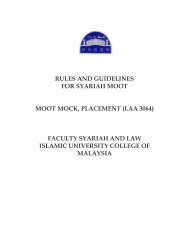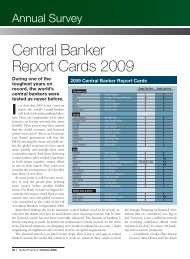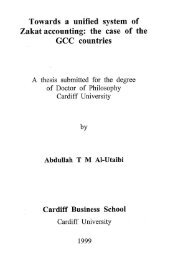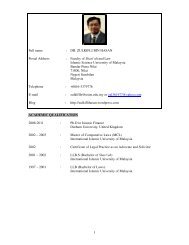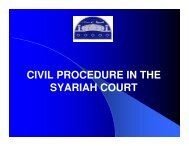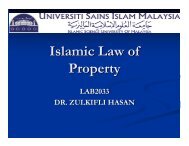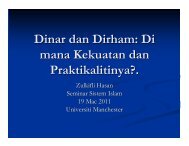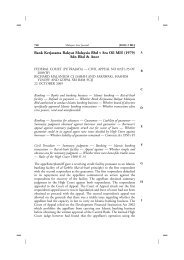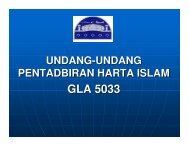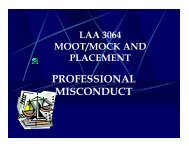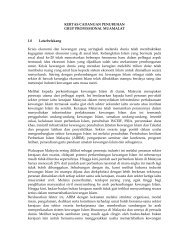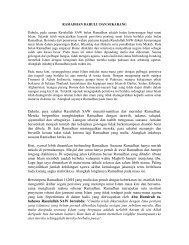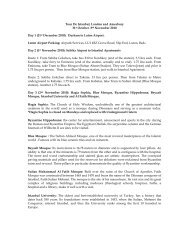Factors Influencing Malaysian Trial
Factors Influencing Malaysian Trial
Factors Influencing Malaysian Trial
You also want an ePaper? Increase the reach of your titles
YUMPU automatically turns print PDFs into web optimized ePapers that Google loves.
Advocacy andLitigation SkillsLAD5093DR. ZULKIFLI HASAN
CONTENTS Introduction <strong>Factors</strong> <strong>Influencing</strong> <strong>Malaysian</strong> <strong>Trial</strong>: Adversarialor Inquisitorial System? Art of Advocacy Accepting a Case Preparation of the Case a)Documents b)witness Speaking In Court
Introduction English Legal system came into existence after COJ. Fused Legal profession. There was no Bar to set up andlicensing control of lawyers.1914 Legal profession Enactment- Established a BarCommittee. 1947- Bar Council was established. 1976- LPA was passed- Establishment of <strong>Malaysian</strong>Bar, Qualifying Board. An advocate and solicitor can be Peguam syarie if hefulfilled the requirements of Peguam syarie .
Admission as anAdvocate and Solicitor Commencement of the pupilage from the date offiling of petition. Period- 9 months, exemption 3 months if supportedwith satisfactory evidence. Master- 7 years experiences as a lawyer. Full time except with leave from Bar Council. If appear in High Court only in chambers. There will be 2 “calls”: Short Call-Interim locus toappear in Court. Long Call-Admission to the HighCourt of Malaya.
Art of Advocacy Art of conducting cases in court both byargument and by the manner of bringing outthe evidence so as to convince the court. It is very important to solicitors whoconducting case in court.
Elements in a SpeechAristotle- 3 elements in a speech. A) The speaker B) The contents of the speech C) The audience. Advocacy is art of persuasion or art ofconvincing others.
<strong>Factors</strong> Determining Advocacy in Court Adversarial System Lawyers play the dominating roles and the judges play thepassive role. In this system the judge is only acted like areferee. A system which provides a contest of 2 people ofconflicting interest. Accusatorial system- In Criminal. The parties are the one who determine the issue ofevidence. Practice by the Court in Malaysia, England andCommonwealth Countries.
Inquisitorial System It refers to the judge participation actively in thelegal proceedings. The judge has the right to call witness even theparties’ disputes are not willingly to call them. Practice by the Court in Europe.
Shariah Court: Inquisitorial or Adversarial? It is submitted that it is a combination of bothinquisitorial and adversarial Systems. Surah An-NisaNisa:135“ O believers, stand firm forjustice and bear true witness for the sake ofAllah even though it be against yourselves, yourparents or your relatives.
Accepting a Case Al-wakalahbil khusumah- Contract of engagement forprofessional service. In civil law known as Retainer. It does not need to be in writing. It may be inferred fromconduct. solicitor-client client relationship. In civil cases it is more preferable to be in writing knownas “warrant to act”. If there is no written authority apresumption is made that the lawyers are acting withoutauthority. Effects: i)Immunity from law suits of defamation ii)Interference may amount to contempt of court.
Essential features for accepting case A) Identify the lawyer and the client B) Identify the purpose for which lawyer isretained. C) Deal with the professional fees and cost. D) Should be signed by both parties. Rule 25 of the Legal Profession (Practice andEtiquette) Rules 1978- To disclose allcircumstances to client.
The Cab Rank Rule Rule 2 of Legal Profession (Practice and Etiquette) Rules1978: The lawyer is bound to act for anyone who wishesto retain service. Reasons: i. To ensure that anyone who requires a lawyer will get onebecause lawyers are not given the choice of client. (SMmust come within the the practice of the practical lawyer.) ii. Lawyers act for the sake of the duty as a lawyer and notbecause he has a choice to act or not to act. After accepting the case lawyers must do the best for theclient and the client must be able to pay the fee.
Exception to the Cab Rank rule Rule 3-Not accept if embarrassed-i) confidential info ii)personal rship Rule 4-In the event of conflict of interest. Rule 5- Difficult to maintain, professional independence. Rule 6-Unable to appear Rule 27-Where the outcome will affect in a pecuniarysense. Rule 28-It appears that you become material witness in thematter. Rule 54-knowingly agree to appear or to act to appear for aparty represented by another lawyer.
Preparation of the Case Good advocacy depends on good preparation. Foundation of success is preparation. It consistsof: i. Evidence (documents and non-documentary)ii. Gathering witnesses iii. Research on the law. In Malaysia lawyers do both preparation andpresentation of the case in court.
Preparation of Documents It is essential to have a thorough knowledge of the law ofevidence and procedure. Q-What has to proved or disproved? How is your case tobe approved and your opponents’ disapproved? Researching the law which applies to the case. Readreported cases. Documentary evidence is very important in civil cases. In criminal cases facts, witness and circumstantialevidences are more important.
POD: First Stage It begins since the time you are engaged as a solicitor.Early stage is discovery and inspection of evidence. Read everything-papers and documentary exhibit. Inspection of document. Client must make fulldisclosure. Make copies of those documents and peruse all ofthem. Try to prevent any element of surprise.
POD: 2 nd Stage Show it to the client an decide which document to beused and left out. i)List of all documents ii) List of documents to be used. Gathering the documents. We must disclose the existence of document in ourpossession which are favorable or not. I)To help usfinding the truth ii) able to asses the evidence. Noelement of surprise in civil case. Rule 23 : To supply to court all information. Acts as an officer of the court rather than as championfor the client.
POD: Third Stage Prepare a chronology of evens as soon as you beginyour preparation of the facts in earnest. Your aim should be to see and understand what reallyhappened. By analyzing the facts. Prepare Plaintiff’s bundle, defendant’s bundle and“agreed bundle of documents”. agreed bundle of documents”. Initiative by both partiesto agree on certain documents to be submitted to thecourt. Ensure that the bundle is correctly paginated.
POD: Fourth Stage Decide how to adduce the documents asevidence. Original documents or primary evidence. Documents should be authenticated. Identification of documents and marking thedocuments as exhibit.
Orderliness Preparation and presentation depends on theorderliness. Keep your court papers in goodorder or in chronological order. Page numbers. Prepare a bundle of documents. Make sure it isnot too thick or large. Labeling the documents.Having clear and detailed knowledge of howyou intend to present the case at the time whendo your pleadings. Cite authorities, set out in good order.
Arguments General principle, when making allegations we shouldpile up as many facts which lead to the conclusion ofthe arguments. When defending we should seek to isolate the factsalleged against us. Look at the exhibits. What is the central issue in the case? What factors support the prosecution or plaintiff on thecentral issue and what the defense? Are the exhibits consistent with the case you want tomake?
Preparation of Witness 2 types of witnesses: i) Witness of facts ii) witness of opinion. Better if we find out the witness from the client. Interview your witness. Why? i) to know his testimony in favour to us or not. ii) reliability iii) whether he has been interviewed by other parties ornot. Ensure that he is willingly act as a witness unless it isnecessary to force witness to come for the trial.“Subpoena”.
POW: First Interview Witness must be interviewed as early as possible. Never coach your witness. During interview ask the witness to relate the story tothe case. The matter must be within his knowledge. Interview the witness separately. Seek clarification and reduce the statement in writing. Prove the testimony. Ask question if necessary. Give the witnesses statement which comprise of thingswhich is admissible or not, relevant or not.
POW: 2 nd Interview To see whether there is any recollection that hehas not disclose. To compare with the testimonyof other witness. Try to fill any gap and find any contradiction.Don’t ever coach the witness to give falseevidence. Offence of Perjury and abetting.
POW: 3 rd Interview Prepare written statement signed by the witnessknown as affidavit. Formulate the question to be asked inexamination in chief. Tell the witness how long would the case isexpected to last. Formulate cross examination question. Witness must be prepared to be cross examined.
POW: General Write out chronology of event Research. The requirements of law and it’s related. Realize the weakness in the evidence andsometime you may have to reformulate the case. Best witness comes first. Prepare list of witness.
Speaking In Court Qualities needed by a Lawyer A good voice Command of words Confidence Persistence Knowledge of law (Law of evidence,Professional ethics, Logic or Knowledge ofMankind and of affairs and General principlesof law. ) Experience
Good Advocacy Appearance- must look neat and tidy. Speak clearly Keep your papers and document in good order. Punctual, do not rush. Cite relevant authorities and in chronologicalorder. Equal approach either big case or small case.
Best Practices Find out who is the judge and list of your case. Be punctual. Introduce ourselves and our opponent in acourtesy manner. The lawyers should not be standing up together. Prepare all the documents and call witness ontime if necessary. Avoid any conduct which amount to contemptof Court. Calm and patient.
Cont.. As a general rule brevity in a speech of any sortis a great virtue. Begin the speech by introducing the parties tothe dispute followed by statement of the pointsat issue. Words that simply child can understand. Explain the detailed facts in dispute. Make sureyou understand it firmly. Strive for accuratestatement of fact. Deal with opponent’s argument point by point.
Cont… Explain your rival’s contention accurately andfairly. Be good humored if necessary. Deal in detail with the law applicable to the case. Clarity in speaking and useful ornaments. Don’t be sycophantic but be polite and respectthe court. Don’t speak too fast and never express youropinion.
Legal Profession (Practice and Etiquette)Rules 1978 Rule 13- To guard against insulting or annoyingquestion Rule 14-Not to ask irrelevant question. Rule 15-Respect to court Rule 18-To conduct with courtesy and fairness. Rule 30-Not to wear robes when appear as awitness. Rule 31-To uphold dignity of the profession



